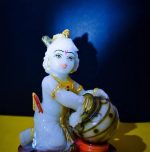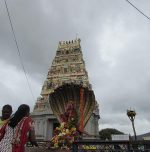The Three Paths: Karma, Bhakti And Jnana – Gita Saar

Uddhava said: “O Lord of lotus-like eyes! ‘To do’ and ‘not to do’; ‘Karma is to be performed’ and ‘Karma is not to be performed’, injunctions and prohibitions—both are Thy injunctions in the Vedas. The Vedas speak of merits and demerits in connection with Karma. They speak of Varna and Ashrama, of differences in time, space, age and objects, of Svarga and Naraka.
How can Thy words consisting of injunctions and prohibitions lead men to the final emancipation or Moksha without the knowledge of distinction between good and bad or merit and defect?
O Lord, the Vedas, Thy words are the highest source of illumination for the manes, the gods and men, regarding this unseen such as Moksha or Svarga, as well as the means and ends.
The idea of distinction as good and bad, right and wrong is derived from Thy own command in the form of Vedas but not by one’s fancy. It is not innate. The same scriptures undermine all ideas of difference. If that distinction is denied or refuted by the same Vedas, I am puzzled and confounded. Therefore, kindly enlighten me on this point.”
The Lord said: “In order to lead them to final happiness three Yogas or ways have been taught by Me. They are Jnana (knowledge), Karma (work) and Bhakti (devotion). There is no other means whatsoever of attaining Moksha.
Jnana Yoga is for those who are disgusted with the performance of Karma and have renounced it. Karma Yoga is for those who are not disgusted with the performance of Karma but are attached to it and who desire for its fruits.
He who has a faith in My actions etc., by some good fortune, and at the same time, is neither disgusted with, nor intensely attached to work, is fit for Bhakti Yoga.
One should perform work so long as he does not feel disgust for it or as long as he is not drawn by love for Me or until he has developed faith and veneration for listening to stories about Me and telling them to others etc.
O Uddhava, he who, following the Dharmas or duties of his own Varna and Ashrama, and performs sacrifices without any desire for fruits, does not go to heaven or hell, provided he does no prohibited act.
He who practises the duties of his own Varna and Ashrama, observes piety and does nothing wrong or prohibited action, attains pure knowledge and develops devotion to Me, remaining in this very world.
Even those in heaven and hell desire this world because this life is conducive for developing knowledge and devotion whereas those two regions or the bodies with which the residents of heaven and hell are endowed are not useful for that purpose.
The wise man does not wish for heaven or hell. He does not even wish for human existence, for connection with the body causes selfish distractions and delusion. He goes astray through attachment to the body.
Being aware of this fact, he should be vigilant and strive for liberation before the approach of death, knowing that the body although it is perishable, can help him in the attainment of his goal or the highest good. Seeing that the tree on which it built its nest is being cut by cruel men, the bird abandons its attachment to the nest and tree and becomes happy by leaving its home. Even so, the wise man who observes and understands that his span of life is being cut short by the rotation of days and nights, shudders with fear and realises the Paramatman or the Supreme Self by abandoning all attachments. Then he is free from all activities. Then he gives up all activities and thereby attains perfect freedom from Prakriti and remains peacefully.
Tile human body which is the primal source of all attainments, is a strong boat, so hard to secure, yet within easy reach, so cheap when once attained. The preceptor is at the helm of this boat and I am the favourable wind that drives it. The man who does not strive to cross the ocean of births with such a boat and with such means as these is truly killing himself.
When the Yogi feels disgust for Karma and becomes dispassionate he should keep the mind in a state of concentration by the practice of meditation on the Atman with his sense under control. When in the act of concentration the mind begins immediately to wander and is unsteady, he should be on the alert and bring it back under his control gradually with unremitting efforts after allowing it to go in its wandering course a little.
Do not allow the mind to go its own way altogether. Keep your Pranas and senses under control and bring the mind under your control with the help of the intellect strengthened by Sattva.
This sort of control of the mind is the highest Yoga, just like the control of an unruly horse. The horseman slackens the reins at first but never lets go the reins. Similarly the Yogi allows the mind to wander a little to have its own way for a while, keeps a vigilant watch over its movements and then brings it gradually under his control.
Reflect on the origin and dissolution of all objects in the order of creation and in the reverse order according to the Sankhya method. Do this till the mind become calm.
When the man becomes disgusted with the world and is endowed with dispassion, when he is able to reflect on what his preceptor has taught him, his mind abandons its evil disposition by virtue of the repeated exercises in meditation.
The mind should be made to think of the only worthy thing Paramatman, by means of Yama and other practices of Yoga or by a correct and thorough examination of the two categories and the knowledge gained thereby (reflecting on the true significance of Tat Tvam Asi Mahavakya)—but by no other means.
If the Yogi does some reproachable and improper act inadvertently, he should burn the sin by Yoga alone but not by any other means i.e., not by expiatory rites. [Japa of Mantra or taking Lord’s name, meditation on the Lord or Brahman, Kirtan, Brahma Chintan or Brahma Vichara will burn the sin of impurity.]
Adherence to the duties of one’s own sphere is said to be virtue (right). By making this distinction between merit and defect a restriction is placed on acts that are by nature impure for the purpose of enabling people to remove attachment to them.
He who has reverential faith in tales about Me, who feels disgust for all actions, who knows that all desires are miseries and is yet incapable of renouncing them, such a man should worship Me with sincere devotion and firm faith; though experiencing those desires and objects he should condemn them as leading to misery.
If a man constantly worships Me by means of Bhakti Yoga mentioned above, all the desires of his heart are destroyed as I Myself dwell in his heart.
The bondage is broken asunder, all his doubts are dispelled and his Karmas are destroyed when I, the Atman of all, am realised.
The practice of knowledge or dispassion is not of any use to the Yogi who has intense devotion to Me and has his mind fixed in Me, and who is Myself.
Whatever is attained by righteous duties, austerities, knowledge, dispassion, Yoga, charity and many other means of attaining good—all that My devotee fully attains through the one course of devotion to Me—even heaven, or liberation, or My abode, if he cares to have it.
My Bhaktas who are solely devoted to Me do not desire anything even if it be offered by Me, not even final liberation or absolute Moksha.
Therefore to want nothing is the great and most efficacious way to attain the highest good. Therefore he who has no desires and cares for nothing attains devotion to Me.
Merits and defects which arise from performance of actions enjoined and prohibited do not affect those devotees who are exclusively devoted to Me, the Supreme Being who is beyond the intellect. They are beyond the limits of Guna (merit) and Dosha (defect).
Those who thus practise these paths to My attainment, the three Yogas that I have just taught, attain My abode of bliss or realisation of Brahman.
Photo by Nick Fewings on Unsplash(Free for Commercial Use)
Image Reference: https://unsplash.com/photos/efD1FBZqYuQ










Leave a Reply